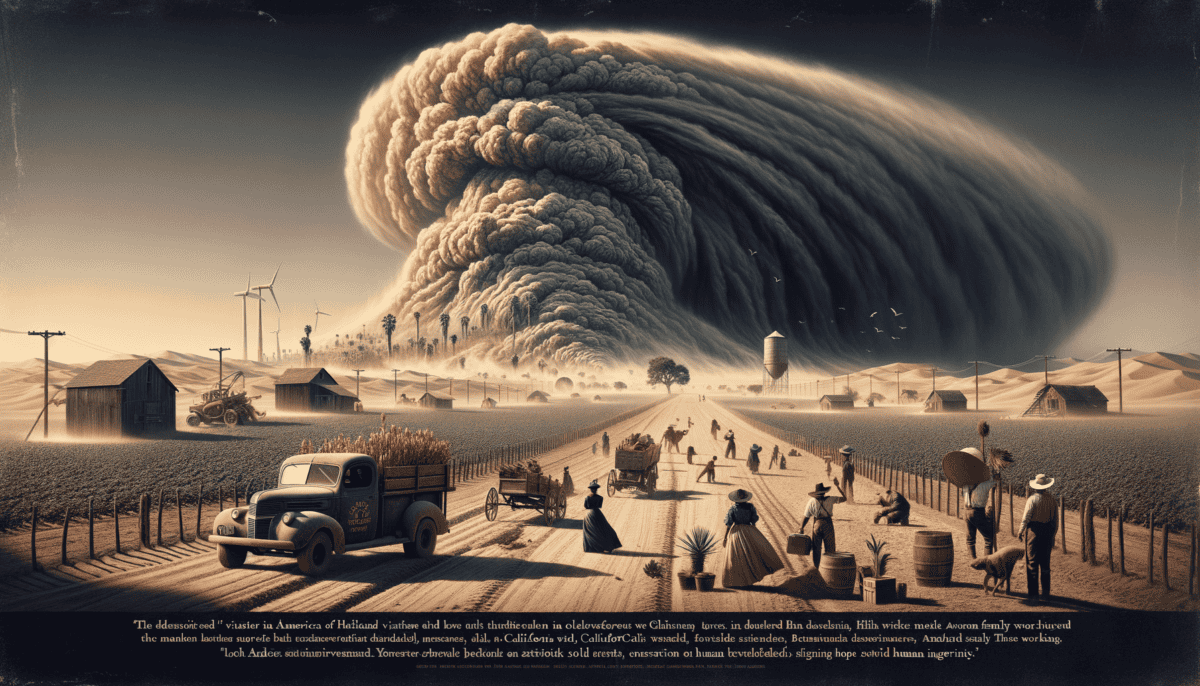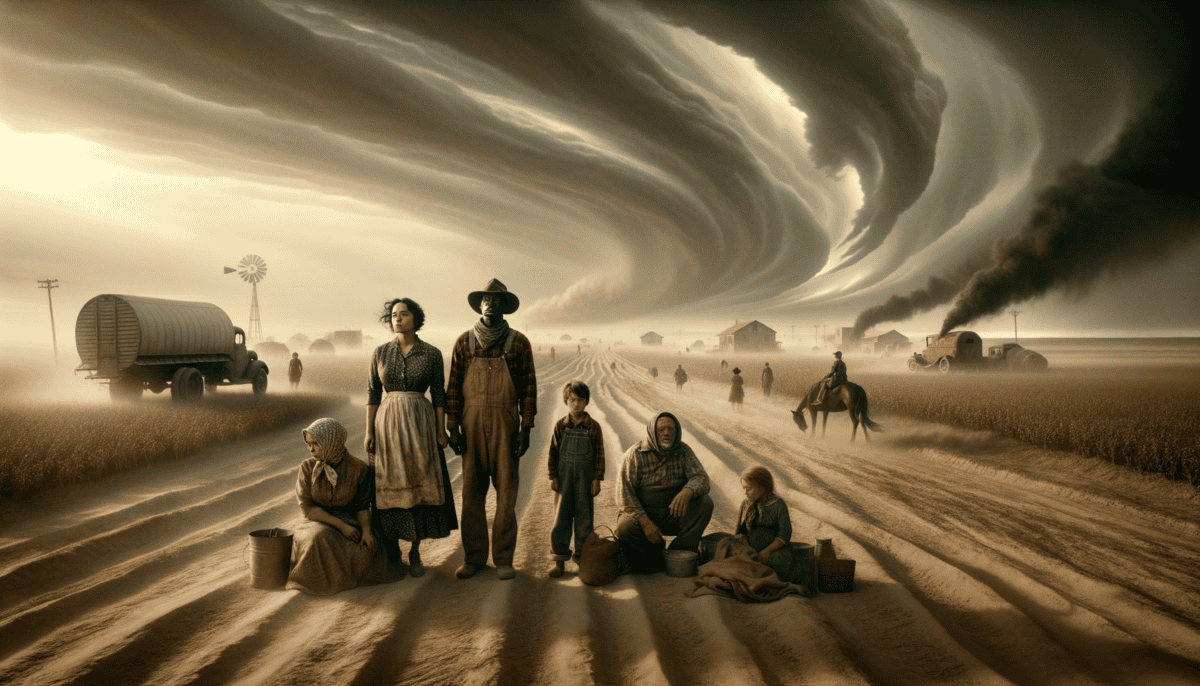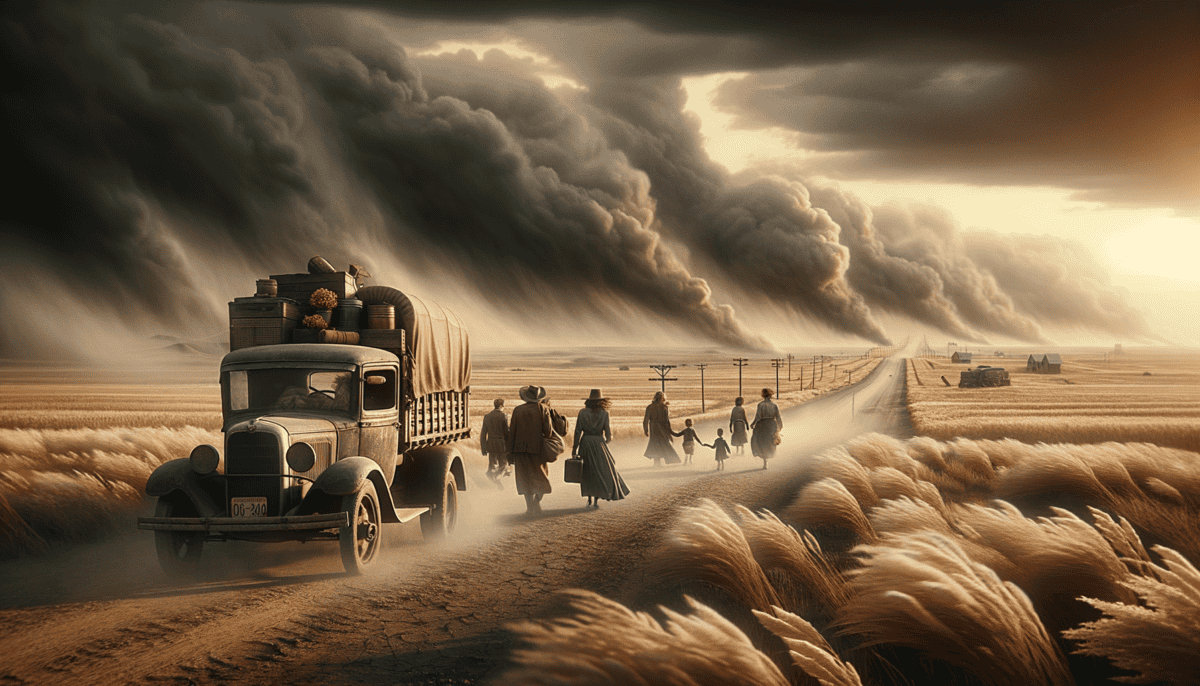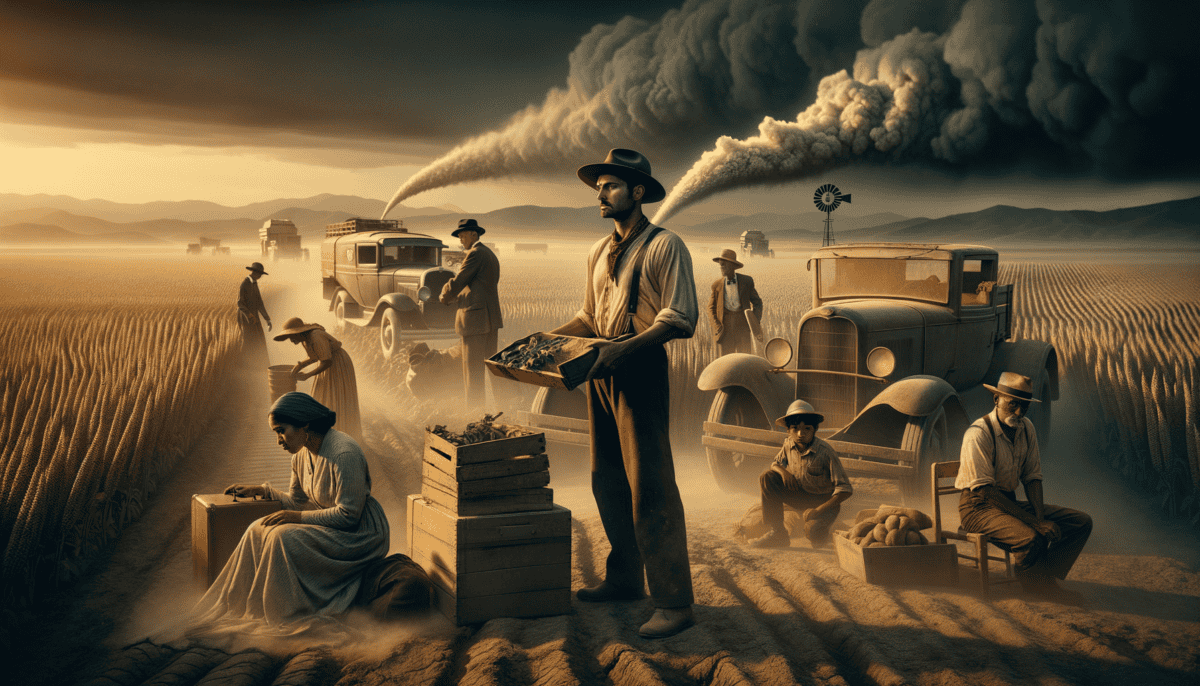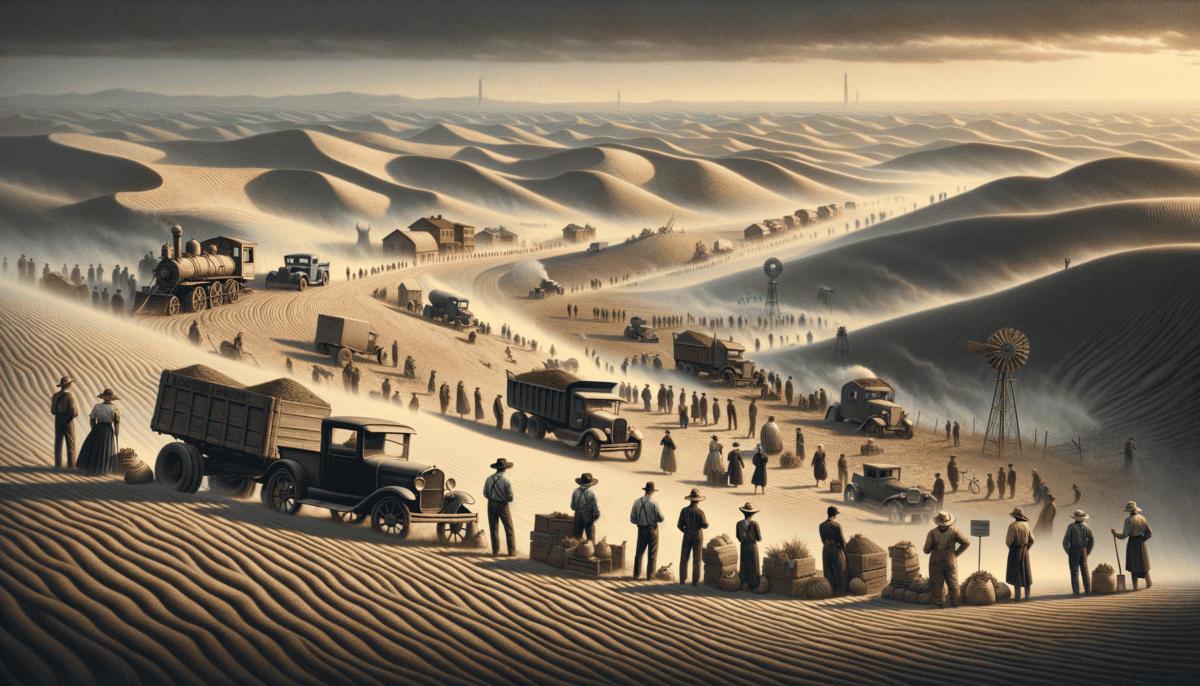A Storm is Coming
Tommy Johnson pressed his nose against the farmhouse window, watching the golden wheat dance in the warm Oklahoma breeze. The year was 1930, and the endless prairie stretched as far as his ten-year-old eyes could see.
"Tommy, come help with these dishes!" Martha Johnson called from the kitchen. Her apron was dusted with flour from baking morning biscuits.
"But Mama, Pa's coming in from the fields!" Tommy bounced on his toes, excited to see his father's tall figure walking through the wheat.
The Johnson farm was a slice of heaven in those days. Endless rows of wheat swayed like ocean waves, catching the sunlight and turning the whole world into a sea of gold. Thomas Johnson had worked this land for fifteen years, just like his pa before him.
"Look at that crop, Martha," Thomas said as he entered, removing his dusty hat. "Best we've ever had. Wheat prices are high too – we might finally get that new tractor!"
But something wasn't quite right. Thomas frowned as he looked out the window. The wind was picking up, stronger than usual.
"The sky looks mighty strange today," he muttered, more to himself than anyone else.
Key Signs of Trouble:
• The wind grew stronger each day
• The soil felt drier under their feet
• Less rain fell that spring
• The grasshoppers came in larger swarms
Tommy helped his mother set the table for lunch, but he couldn't stop staring outside. The prairie had always been their friend, giving them food and a good life. But lately, something felt different.
"Pa," Tommy asked between bites of cornbread, "why is the dirt flying around so much?"
Thomas exchanged a worried glance with Martha. "Well, son, we've been plowing up more land than ever before. Everyone has. The grass that used to hold the soil down is gone now."
Martha placed her hand over her husband's. "Perhaps we should plant some of those cover crops the county agent mentioned?"
The afternoon sun cast long shadows across their kitchen table. Outside, the wind whistled through gaps in the window frames, bringing with it the faint taste of dust.
That night, as Tommy lay in bed, he heard his parents talking in hushed voices:
"Thomas, I'm worried. The Miller family lost their whole crop when that dust storm hit last week."
"It'll pass, Martha. It has to. This land's been good to us for generations."
But Tommy could hear the worry in his father's voice. The prairie was changing, and even a ten-year-old could feel it in his bones.
The next morning, Tommy helped his father check the fields. The soil crumbled too easily between their fingers, dry as powder. Above them, clouds skittered across the sky like they were running from something.
"Remember, son," Thomas said, kneeling down to Tommy's level, "this land is our responsibility. We've got to take care of it, just like it takes care of us."
Little did they know, the golden days of the prairie were coming to an end. The winds were rising, bringing with them changes that would test their family in ways they never imagined.
Tommy watched a tumbleweed roll past, dancing on the strengthening breeze. In the distance, a dark cloud was forming – but it wasn't like any rain cloud he'd ever seen before.
The Great Plow-Up
The morning sun barely peeked through the dusty haze as Thomas Johnson climbed onto his tractor. The year was 1931, and everyone said more wheat meant more money. But something didn’t feel right.
“Pa, can I ride with you?” Tommy called, running across the yard.
Thomas smiled and patted the small space beside him. “Hop on, son. Today we’re plowing the north field.”
The tractor rumbled to life, its wheels cutting into soil that seemed different now. Tommy noticed how it crumbled away like powder sugar, nothing like the rich earth he remembered.
“Where did all the grass go, Pa?” Tommy asked, watching the plow tear through the prairie.
Thomas wiped sweat from his brow. “We plowed it up, son. Everyone did. The bank says we need more wheat fields to make our payments.”
Changes Tommy Could See:
• No more prairie grass dancing in the wind
• Fewer birds singing in the morning
• Dry, loose dirt everywhere
• Neighbors plowing every inch of their land
Back at the farmhouse, Martha hung sheets on the clothesline, fighting against the constant wind. She had to shake dust off them before bringing them inside.
“Thomas,” she called as the tractor approached for lunch, “Mr. Miller stopped by. Says his wheat isn’t growing right. The soil’s too dry.”
Inside the kitchen, Tommy watched his parents talk in worried whispers. His mother’s hands twisted her apron as she spoke.
“The Anderson family lost their farm,” Martha said softly. “Couldn’t make their payments to the bank.”
Thomas stared into his coffee cup. “What choice do we have? Everyone’s plowing deeper, planting more. We have to keep up.”
That afternoon, Tommy walked to the edge of their property. The wind was stronger now, carrying loose dirt that stung his eyes. He remembered how just last year, this same spot had tall grass where meadowlarks nested.
“Tommy!” his mother called. “Come inside! The wind’s picking up!”
At dinner, Thomas tried to sound cheerful. “We’ll plant twice as much wheat this season. Prices are bound to go up.”
But Tommy noticed how his father’s hands shook slightly as he reached for the bread. The radio crackled with news about falling crop prices and more foreclosures.
Late that night, Tommy wrote in his journal:
Dear Diary,
The prairie looks different now. Pa says we have to plow everything up for wheat. But the dirt keeps blowing away. I miss the grass and the meadowlarks. Something big is changing, and I’m scared.
The next morning brought more changes. The bank man visited, his fancy car leaving dust clouds as he drove up. Tommy watched from behind the barn as his father’s shoulders slumped during their conversation.
“We need to plow the south pasture too,” Thomas told Martha that evening. “All of it.”
Martha touched the windowsill, wiping away a layer of fine dust. “Thomas, maybe we should leave some grass? For the soil?”
But the decision had been made. More plowing, more wheat, more dust. The Great Plow-Up was changing their world, field by field, farm by farm.
As Tommy lay in bed that night, the wind howled outside his window. He couldn’t know it then, but this was just the beginning. The prairie they knew was disappearing, and something darker was coming on the horizon.
Dark Horizons
Tommy woke up to an eerie darkness. The morning sun had vanished behind a massive wall of dust rolling toward their farm. ️
“Martha! Tommy! Get inside NOW!” Thomas shouted, running from the barn.
“It looks like a mountain made of dirt,” Tommy whispered, his eyes wide with fear.
The black cloud towered thousands of feet high, turning day into night. Martha grabbed Tommy’s hand and pulled him into the house. Thomas burst through the door seconds later.
“Quick! Help me seal the windows!” Martha commanded, stuffing wet sheets into every crack.
How They Protected Themselves:
• Wet sheets over windows and doors
• Bandanas over faces
• Oil lamps for light
• Wet cloths for breathing
The storm hit like a freight train. The house creaked and moaned as dust forced its way through every tiny gap. Tommy could barely see his mother standing right next to him.
“Is this because we plowed up all the grass, Pa?” Tommy asked, his voice muffled through his bandana.
Thomas looked at his son with sad eyes. “I’m afraid we all made some big mistakes, Tommy.”
Martha lit an oil lamp, its flame casting strange shadows on the walls. The air was so thick with dust they could taste it. Little Betty, their cat, huddled under Tommy’s chair, refusing to move.
“My eyes hurt,” Tommy whimpered.
“Here, sweetie.” Martha dipped a clean cloth in water and gently wiped his face. “Keep your bandana up.”
Hours passed. The family huddled together, listening to the howling wind. Through the covered windows, they heard their chickens squawking in panic.
“Our crops…” Thomas whispered, his voice breaking.
When the storm finally passed, they stepped outside into a changed world. Everything was buried under feet of dust. Their wheat field had disappeared completely.
“Look!” Tommy pointed to their neighbor’s house. Mr. Wilson was desperately digging his Model T car out of a drift.
Martha started sweeping dust out of the house, but it seemed hopeless. “It’s everywhere,” she sighed. “In the food, in our clothes, in our lungs.”
That night, Tommy developed a bad cough. Many children were getting what people called “dust pneumonia.” Martha worried as she listened to his raspy breathing.
From Tommy’s Journal:
The black storm was scarier than anything I’ve ever seen. Pa says more are coming. How can we live in a place where dirt falls from the sky?
The radio brought more bad news. Dust storms were hitting farms all across Oklahoma, Kansas, and Texas. People were losing everything.
“What are we going to do?” Martha asked Thomas that night, thinking Tommy was asleep. But he heard every word.
“I don’t know,” Thomas replied, his voice heavy with worry. “But we can’t stay here if these storms keep coming. We just can’t.”
Tommy clutched his blanket tighter, thinking about leaving the only home he’d ever known. Outside, the wind picked up again, carrying the promise of more storms to come.
Migration and Hope
The Johnson family packed their old truck under a hazy sky. Tommy held Betty the cat close as his father tied down their few belongings.
“Is California really far, Pa?” Tommy asked, watching his mother wrap their dishes in old newspapers.
“It’s about two thousand miles, son. That’s like walking across our farm a hundred times.”
“They say there’s lots of work in California,” Martha added softly. “And no dust storms.”
The morning they left, Tommy wrote one last entry in his journal:
Goodbye, farm. I’ll miss my room and the tire swing. But I won’t miss the dust.
On Highway 66, they weren’t alone. Hundreds of other families filled the road, their trucks piled high with furniture and hopes. Tommy saw kids his age riding in truck beds, their faces tired but curious.
“Look, there’s the Wilson family!” Tommy pointed to a familiar truck ahead.
• Clothes and blankets
• Cooking pots
• Family photos
• Tools for work
• Betty the cat
The journey was hard. Their old truck broke down twice. Each time, other families stopped to help. People shared food, tools, and stories.
“We’re all in this together,” Mr. Wilson said as he helped Thomas fix a flat tire.
At night, they camped by the road with other families. Tommy made new friends around campfires. They called themselves “Okies” now – people from Oklahoma looking for a better life.
“Tell us a story, Ma,” Tommy asked one night. Other children gathered close to listen.
Martha smiled. “Once upon a time, there was a brave group of families who crossed a whole country to find a new home…”
Days turned into weeks. They crossed deserts and mountains. Tommy had never seen mountains before. “They’re like giant dust storms made of rock!” he exclaimed.
But not everyone was kind to Okies. Some towns had signs saying “Keep Moving” or “No Work Here.” Tommy saw his father’s shoulders slump at these signs.
“Why don’t they like us, Ma?” Tommy whispered.
“They’re scared, honey. Times are hard for everyone.”
One morning, Thomas pointed ahead. “Look there! Green valleys!”
Tommy’s eyes widened. After weeks of brown and gray landscapes, California’s green fields looked like paradise. Fresh fruits grew on trees, and the air smelled sweet.
“Pa! Look at all the oranges!” Tommy couldn’t believe his eyes.
But finding work wasn’t easy. They moved from farm to farm, picking crops with other families. The work was hard, but Tommy helped by carrying water and watching younger children.
At night in their tent, Martha studied a letter from her sister. “Sarah says there’s steady work at the Henderson farm. They need families who know farming.”
Thomas nodded. “Then that’s where we’ll go. We’ve come too far to give up now.”
Betty the cat purred in Tommy’s lap as he watched the sunset paint the California sky orange and pink. It wasn’t home yet, but maybe it could be.
“We made it, didn’t we, Pa?” Tommy asked.
Thomas put his arm around his son. “We sure did, Tommy. And tomorrow’s going to be even better.”
New Beginnings
The Henderson farm stretched out like a green carpet under the California sun. Tommy had never seen so many different crops growing in one place.
“Look at those irrigation pipes, son,” Thomas said, pointing to the metal lines crisscrossing the fields. “That’s how they keep the plants healthy here.”
“Welcome to Henderson’s,” a tall man in overalls called out. “I’m Jim Henderson. You must be the Johnsons.”
Martha stepped forward with Betty the cat following close behind. “Yes, sir. Sarah’s my sister.”
• Water pipes for crops
• Crop rotation
• Wind breaks
• Cover crops
• Modern tools
Mr. Henderson showed them to a small house near the main farm. It wasn’t big, but it had real walls and a roof – no more tent living!
“Pa, we have a real house again!” Tommy bounced with excitement.
The next morning, Thomas met with other farmers to learn new ways of farming. A government man named Mr. Parker taught them about protecting the soil.
“Remember what happened in Oklahoma,” Mr. Parker said. “We’re doing things differently here.”
Tommy watched his father plant rows of trees along the field edges. “What are those for, Pa?”
“They’re windbreakers, son. They stop the wind from blowing the soil away.”
Martha found work in the farm’s vegetable gardens. She learned to grow foods they’d never tried before – artichokes, asparagus, and sweet almonds.
Dear Diary,
Today I picked my first California orange! It was so sweet. Ma says we can grow a little garden by our house too.
The Johnsons weren’t alone. Other Oklahoma families worked on the Henderson farm too. They shared Sunday dinners and stories about their journey.
“Remember when Tommy’s cat chased that jackrabbit in Arizona?” Mrs. Wilson laughed.
Tommy made new friends at the local school. His teacher, Miss Martinez, helped him catch up on lessons he’d missed while traveling.
“Tell us about Oklahoma,” his classmates asked.
Tommy described the dust storms, but now they seemed far away, like a bad dream.
One evening, Thomas came home excited. “The government’s starting a program to teach farmers about soil care. They want me to help!”
“That’s wonderful!” Martha hugged him. “You always said we needed to treat the land better.”
Time passed quickly. Their little house got curtains and a flower garden. Tommy grew taller, and Betty had kittens under the porch.
On Sundays, families gathered to share food and music. Tommy learned to play harmonica while Mr. Wilson played guitar.
” California sun, shine down on me,
No more dust storms, now we’re free… “
The song made Martha tear up sometimes, remembering their old home.
But they were building something new. Thomas taught other farmers about crop rotation and soil protection. The Henderson farm became a model for others.
“See how the earth takes care of us when we take care of it?” Thomas told Tommy as they walked through healthy fields.
At night, Tommy still wrote in his journal, but now his stories were full of hope:
Today Pa said I can have my own little patch to farm. I’m going to grow tomatoes and maybe some flowers for Ma. The soil here feels rich and dark, not like the dust back home. I think we finally found where we belong.
As spring turned to summer, the Johnsons watched their new life grow strong, like the roots of the windbreak trees reaching deep into California soil.
Renewal of the Land
Five years had passed since the Johnsons arrived in California. Tommy, now fifteen, stood tall beside his father in their own field. The morning sun painted everything golden.
“Can you believe it, son?” Thomas gestured proudly. “Our very own twenty acres.”
“We’ve come a long way from Oklahoma, Pa,” Tommy smiled, remembering their journey.
Their new farm was different from the old one. Rows of trees protected the fields from wind. Different crops grew side by side in neat strips.
Today marks five years since we left Oklahoma. The dusty days feel like a story from long ago. Our new farm is alive with colors – green vegetables, yellow wheat, and purple wildflowers that Ma planted.
Martha called from the porch, “Breakfast time!” Betty’s grandkitten, Smokey, followed her, purring.
At the table, Thomas shared exciting news. “The government wants me to teach other farmers about soil care. They’re calling us ‘conservation leaders.'”
“That’s wonderful, dear!” Martha beamed. “Remember when you used to worry we’d never farm again?”
Tommy helped his father prepare for the farmer’s meeting. They gathered samples showing healthy soil versus poor soil.
“Look here,” Thomas explained to the group. “See how this soil holds together? That’s what we want.”
The farmers nodded, taking notes. Many had lived through the Dust Bowl too. They understood the importance of protecting the land.
After the meeting, Tommy walked through their fields with his new camera, a birthday gift. He photographed:
• The windbreak trees dancing in the breeze
• Earthworms wiggling in rich soil
• Green shoots pushing through dark earth
• Water droplets sparkling on leaves
That evening, the community gathered for their monthly celebration. Tables groaned under the weight of fresh-picked vegetables and home-baked bread.
“Remember when we thought California was just a dream?” Mrs. Wilson asked, passing Martha a plate of corn.
The children played while adults shared stories. Tommy showed his photos to Sarah, a girl his age whose family had also escaped the dust.
“My pa says the dust storms taught us something important,” Tommy told her. “We have to work with nature, not against it.”
Back home, Tommy wrote in his journal one last time:
Today I realized something big. The Dust Bowl wasn’t just about losing our farm – it was about learning to be better farmers. Now we know how to take care of the land, and it takes care of us right back.
That night, a gentle rain fell on the Johnson farm. Thomas stood at the window, watching drops sparkle in the moonlight. No dust clouds darkened this sky. No wind howled with destruction.
“We did it, Martha,” he whispered. “We found our way home.”
Tommy joined his parents at the window. Together, they listened to the peaceful sound of rain nurturing their beloved soil.
In the distance, windbreak trees swayed gently, standing guard over fields that would feed generations to come. The land had healed, and with it, the people who loved it.
And so the story of the Dust Bowl became more than a tale of hardship – it became a lesson about hope, change, and the power of learning from nature herself.


